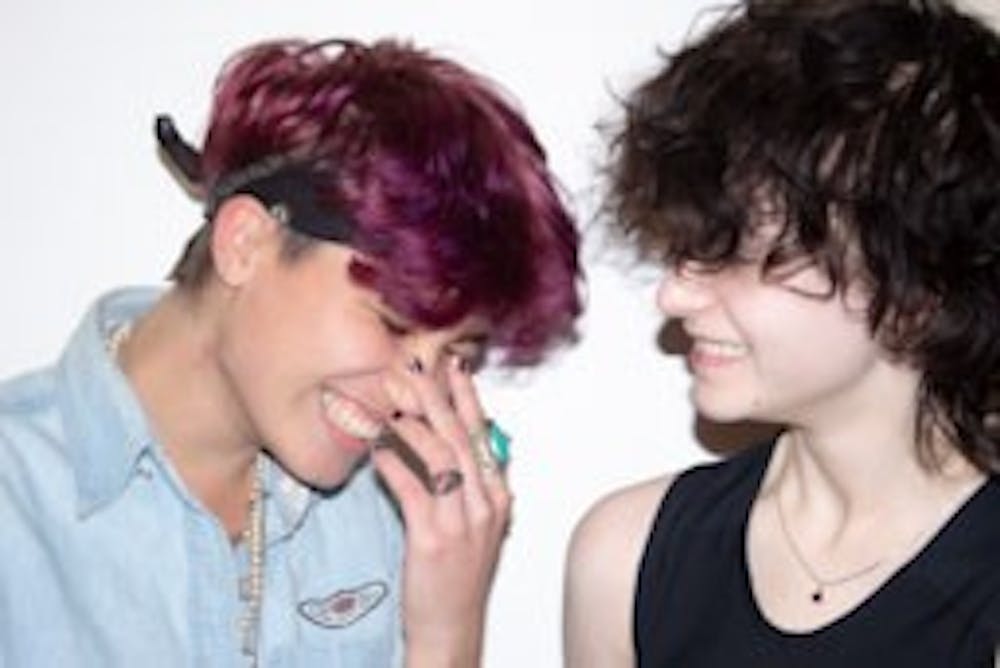The decades-long trials of nonbinary people continue even at the University of New Mexico, and two students in particular — Ari Williams and Noe Fields-Perkins — have felt the struggles of standing out against the majority.
Williams, a Washington-based film student at UNM, identifies as both nonbinary and transgender and is forced almost daily to question the societal guidelines that align with and rely on a binary gender construct to determine social roles.
“Boy or girl, when you don’t pass as one or the other or both, your worth is put into question, the validity of your gender is put into question, your humanity is put into question,” Williams said.
Fields-Perkins, who moved from Hawaii to pursue a major in theater at UNM, has navigated two vastly different states: the expectations placed upon nonbinary people by both cisgender and transgender communities.
“There’s the binary standards of beauty in the world in general … And there’s the beauty standards in the nonbinary and trans community,” Fields-Perkins said. “I personally identify as nonbinary; I identify with everything on the spectrum … But even within the trans community, there are binary standards, ideas on what is correct for transness.”
Within trans communities, Williams observed the greatest beauty standard as binary passability. Passability, as defined by Williams, is “appearing (to be) assigned at birth the gender you identity (with); looking cis.”
“People often equate trans and nonbinary people's passability as their worth, and it’s interesting living through that,” Williams said. “But (nonbinary) is not a third gender — it’s escaping from that binary, so the beauty standards cannot apply.”
Outside of pressures toward binary assimilation, Fields-Perkins has experienced more anti-trans hate since moving to New Mexico from Hawaii.
“I didn’t question my safety ever before I came here … When I came to UNM, that was the first time I’d really been called slurs,” Fields-Perkins said. “Where I come from is different (regarding) perspectives on transness.”
Even those who claim acceptance or credence for all facets of queer presentation and representation can fall into damaging patterns of appeasement or even exhibition, sexual or otherwise, according to Williams.
“There's the placation and the objectification … and then there’s just the disrespect,” Williams said. “Transness to cisgender society is a spectacle, but when you make someone into a spectacle, they are no longer human.”
While the limitations of a binary standard are detrimental to nonbinary individuals, the limitlessness of nonconformity may be seen as an aggressor through the lens of a gendered society, according to Williams. The power of it poses mortal dangers which many choose to avoid — consciously or otherwise — through the pursuit of passability.
Get content from The Daily Lobo delivered to your inbox
“When you can no longer put people into that safe binary, they become dangerous because they can no longer serve society … Being trans is very dangerous for the system,” Williams said. “And I think a lot of people talk about being stealthy (because) beyond safety, it also keeps you from being a spectacle.”
These dangers of being trans or nonbinary upon the system and the individual are, for many, only the beginning. As a Pacific Islander, Fields-Perkins has experienced exclusion both in and outside of the trans community.
“Within the trans community, there’s definitely a lot of racism and fatphobia … The transmasculine standard is to be white and skinny and I’m a mixed kid, so I definitely have some issues,” Fields-Perkins said.
Despite the resolute dangers of gender expression outside the binary, Fields-Perkins’ exploration of the spectrum of gender has been integral in the unearthing of their beauty as perceived by self and society.
“I’m not masculine enough to be an attractive man and I’m not feminine, so what (did) that make me?” Fields-Perkins said. “I never really felt attractive until I started to explore my masculinity.”
The exploration of beauty outside of the binary is, to Williams, vastly important.
“Not adhering to one side of a binary can be so very beautiful,” Williams said.
Natalie Jude is the culture editor at the Daily Lobo. She can be contacted at culture@dailylobo.com or on Twitter @natalaroni






